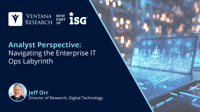I am happy to share insights gleaned from our latest Buyers Guide, an assessment of how well software providers’ offerings meet buyers’ requirements. The Cloud Computing Platforms Ventana Research Buyers Guide is the distillation of a year of market and product research by ISG and Ventana Research.
Read More
Topics:
Cloud Computing,
Digital Technology
Embracing artificial intelligence technologies opens doors for innovation and efficiency. Alongside these opportunities, however, come risks. Threat actors are keenly aware of the potential impact of AI systems and are actively exploring ways to manipulate them. In this Analyst Perspective, I explore the world of adversarial machine-learning threats and provide practical guidance for securing AI systems.
Read More
Topics:
Digital Technology,
Digital Security,
Generative AI,
AI and Machine Learning,
DevOps and Platforms,
Model Building and Large Language Models,
Machine Learning Operations,
NIST,
Model Training
ServiceNow is a global software provider that has developed a cloud computing platform that helps organizations manage digital workflows for enterprise operations. The provider uses its annual Knowledge user conference to educate customers and showcase product announcements. Ventana Research had the opportunity to attend the Knowledge 2024 event and provides this analyst perspective to summarize what transpired.
Read More
Topics:
IT Service Management,
Digital Technology,
natural language processing,
Digital Security,
Field Service,
Generative AI,
AI and Machine Learning,
Observability,
Intelligent Automation,
ITOps
The technology landscape for enterprise IT faces a daunting challenge: complexity. As systems grow more intricate, organizations must actively seek ways to simplify the technology stack. This process, known as decomplexification, is crucial for enhancing efficiency, security and collaboration within an enterprise.
Read More
Topics:
Cloud Computing,
IT Service Management,
Digital Technology,
Digital Security,
DevOps and Platforms,
IoT and Edge Computing,
Intelligent Automation,
ITOps,
IaC,
CI/CD,
SASE
Enterprises are increasingly recognizing the need to streamline operations for efficiency, agility and innovation. This has led to various “operations” or “Ops” initiatives, each focusing on a specific aspect of enterprise IT. From software development and data analytics to IT and cloud management, these Ops groups are transforming the way enterprises operate and compete.
Read More
Topics:
Analytics,
Cloud Computing,
Digital Technology,
data operations,
digital finance,
Digital Security,
Observability,
Analytic Operations,
DevOps and Platforms,
ITOps,
CloudOps,
Machine Learning Operations,
MLOps,
SecOps,
ProjectOps,
AIOps,
NetOps,
DevSecOps,
SecFinOps
Is your organization prepared for the increasingly sophisticated and pervasive cyber threats that are challenging enterprise CIOs and IT leaders? Our previous analyst perspective underscored the importance of protecting digital assets and driving business growth with Continuous Threat Exposure Management (CTEM) — a proactive approach to identifying and managing cyber threats. In this perspective, we delve into the crucial business and technology considerations that enterprises must weigh when...
Read More
Topics:
Digital Technology,
Digital Security,
Security Posture,
Threat Management,
Threat Landscape,
SOC,
Continuous Threat Exposure Management,
CTEM
Cyber threats are becoming more sophisticated and pervasive, posing a major challenge for CIOs and IT leaders. To protect their digital assets and drive business growth, they need a new approach to security: Continuous Threat Exposure Management (CTEM). CTEM software continuously monitors and manages the enterprise’s exposure to cyber risks, enabling a swift and effective response to any security incident. In this analyst perspective, we will explore how CTEM software works, why it is essential...
Read More
Topics:
Digital Technology,
Digital Security,
Security Posture,
Threat Management,
Threat Landscape,
SOC,
Continuous Threat Exposure Management,
CTEM
The migration of on-premises applications to the cloud has become more than just a technological shift; it’s a strategic imperative for enterprises. This transition, driven by the need for competitiveness, agility and responsiveness in a rapidly evolving business environment that operates at the speed of digital, is not a simple task. It requires a careful balance between the technology roadmap and the strategic business objectives of the organization.
Read More
Topics:
Cloud Computing,
Digital Technology,
CloudOps,
Migration
Ventana Research recently announced its 2024 Market Agenda for Digital Technology. This agenda is designed to provide expertise to enterprises across various industries, helping them prioritize technology investments that enhance workforce effectiveness, customer engagement and enterprise agility. Digital Technology is especially important for CIO and Chief Digital Officers looking to rationalize and modernize their IT portfolio. Our expertise will see a significant expansion on this topic in...
Read More
Topics:
Business Continuity,
Cloud Computing,
IT Service Management,
Digital Technology,
Digital Security,
Observability,
DevOps and Platforms,
IoT and Edge Computing,
Intelligent Automation,
ITOps
Imagine a world where artificial intelligence (AI) seamlessly integrates into every facet of your business, only to subtly distort your data and skew your insights. This is the emerging challenge of AI hallucinations, a phenomenon where AI models perceive patterns or objects that do not exist or are beyond human detection.
Read More
Topics:
Digital Technology,
AI and Machine Learning



















